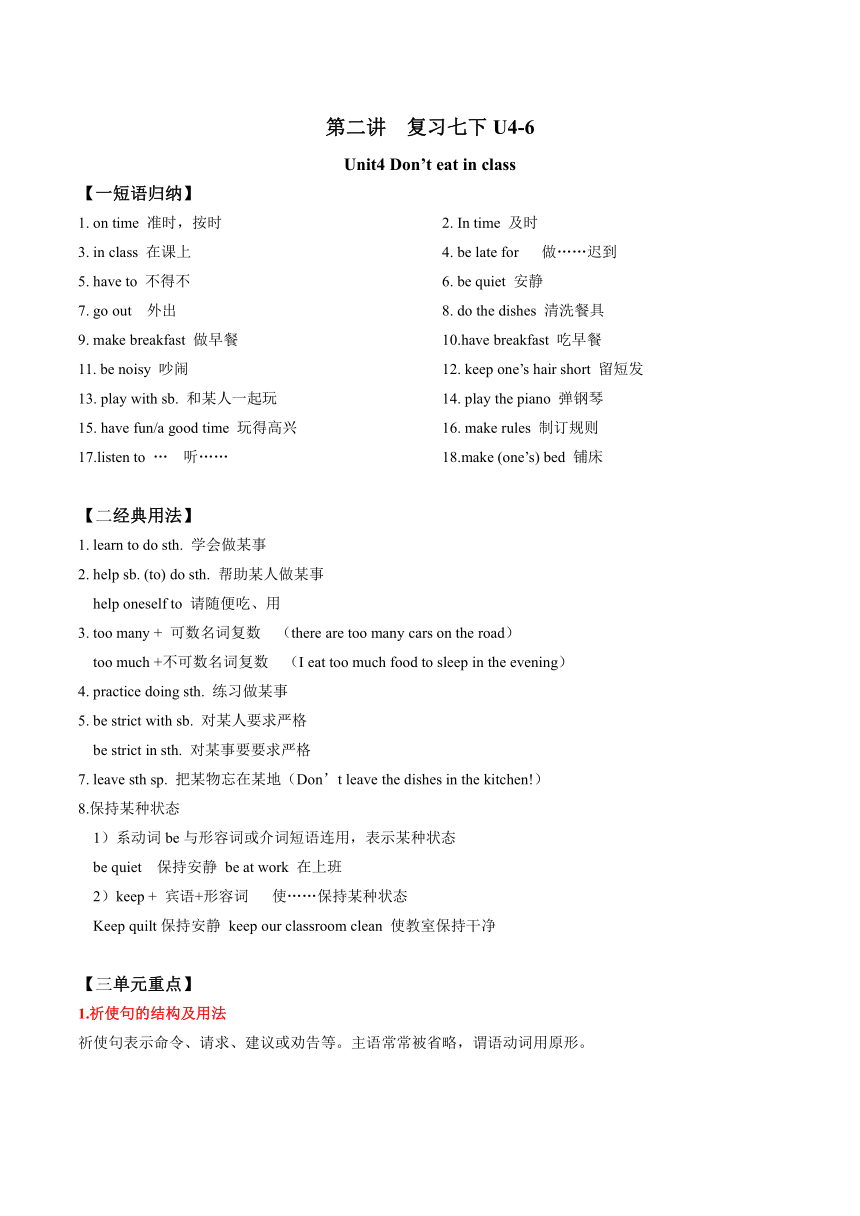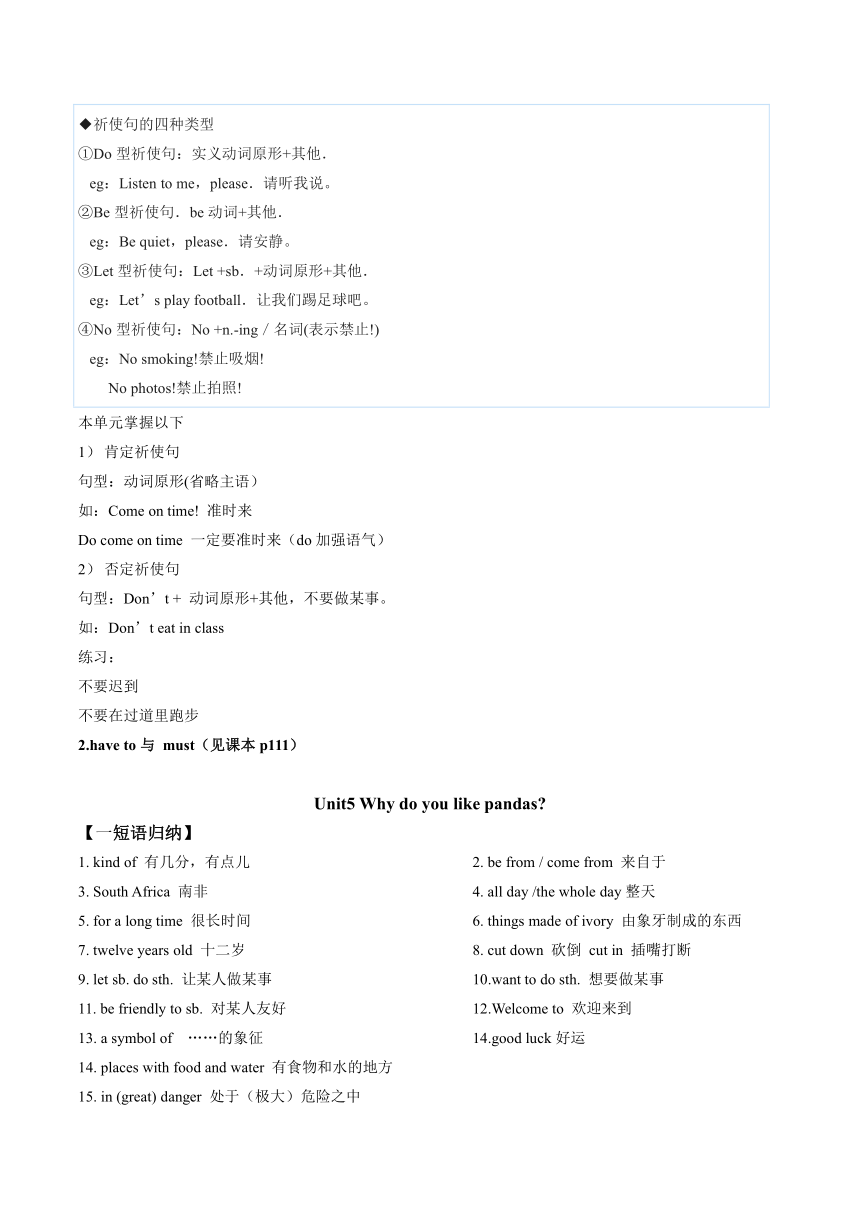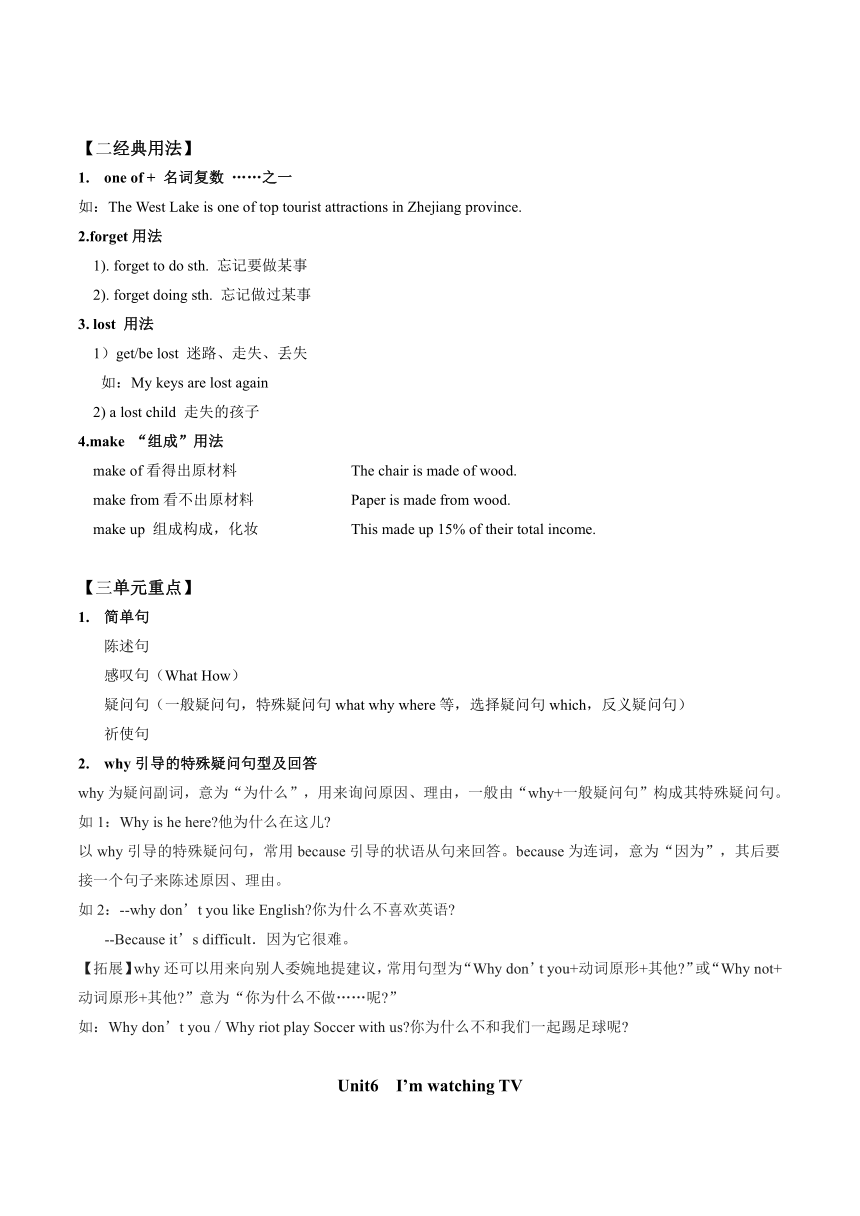Unit 4~6 复习讲义-2023-2024学年人教版英语七年级下册 (无答案)
文档属性
| 名称 | Unit 4~6 复习讲义-2023-2024学年人教版英语七年级下册 (无答案) |

|
|
| 格式 | docx | ||
| 文件大小 | 29.2KB | ||
| 资源类型 | 教案 | ||
| 版本资源 | 人教新目标(Go for it)版 | ||
| 科目 | 英语 | ||
| 更新时间 | 2024-07-02 23:04:27 | ||
图片预览



文档简介
第二讲 复习七下U4-6
Unit4 Don’t eat in class
【一短语归纳】
1. on time 准时,按时 2. In time 及时
3. in class 在课上 4. be late for 做……迟到
5. have to 不得不 6. be quiet 安静
7. go out 外出 8. do the dishes 清洗餐具
9. make breakfast 做早餐 10.have breakfast 吃早餐
11. be noisy 吵闹 12. keep one’s hair short 留短发
13. play with sb. 和某人一起玩 14. play the piano 弹钢琴
15. have fun/a good time 玩得高兴 16. make rules 制订规则
17.listen to … 听…… 18.make (one’s) bed 铺床
【二经典用法】
1. learn to do sth. 学会做某事
2. help sb. (to) do sth. 帮助某人做某事
help oneself to 请随便吃、用
3. too many + 可数名词复数 (there are too many cars on the road)
too much +不可数名词复数 (I eat too much food to sleep in the evening)
4. practice doing sth. 练习做某事
5. be strict with sb. 对某人要求严格
be strict in sth. 对某事要要求严格
7. leave sth sp. 把某物忘在某地(Don’t leave the dishes in the kitchen!)
8.保持某种状态
1)系动词be与形容词或介词短语连用,表示某种状态
be quiet 保持安静 be at work 在上班
2)keep + 宾语+形容词 使……保持某种状态
Keep quilt保持安静 keep our classroom clean 使教室保持干净
【三单元重点】
1.祈使句的结构及用法
祈使句表示命令、请求、建议或劝告等。主语常常被省略,谓语动词用原形。
◆祈使句的四种类型 ①Do型祈使句:实义动词原形+其他. eg:Listen to me,please.请听我说。 ②Be型祈使句.be动词+其他. eg:Be quiet,please.请安静。 ③Let型祈使句:Let +sb.+动词原形+其他. eg:Let’s play football.让我们踢足球吧。 ④No型祈使句:No +n.-ing/名词(表示禁止!) eg:No smoking!禁止吸烟! No photos!禁止拍照!
本单元掌握以下
肯定祈使句
句型:动词原形(省略主语)
如:Come on time! 准时来
Do come on time 一定要准时来(do加强语气)
否定祈使句
句型:Don’t + 动词原形+其他,不要做某事。
如:Don’t eat in class
练习:
不要迟到
不要在过道里跑步
2.have to与 must(见课本p111)
Unit5 Why do you like pandas
【一短语归纳】
1. kind of 有几分,有点儿 2. be from / come from 来自于
3. South Africa 南非 4. all day /the whole day整天
5. for a long time 很长时间 6. things made of ivory 由象牙制成的东西
7. twelve years old 十二岁 8. cut down 砍倒 cut in 插嘴打断
9. let sb. do sth. 让某人做某事 10.want to do sth. 想要做某事
11. be friendly to sb. 对某人友好 12.Welcome to 欢迎来到
13. a symbol of ……的象征 14.good luck好运
14. places with food and water 有食物和水的地方
15. in (great) danger 处于(极大)危险之中
【二经典用法】
one of + 名词复数 ……之一
如:The West Lake is one of top tourist attractions in Zhejiang province.
2.forget用法
1). forget to do sth. 忘记要做某事
2). forget doing sth. 忘记做过某事
3. lost 用法
1)get/be lost 迷路、走失、丢失
如:My keys are lost again
2) a lost child 走失的孩子
4.make “组成”用法
make of看得出原材料 The chair is made of wood.
make from看不出原材料 Paper is made from wood.
make up 组成构成,化妆 This made up 15% of their total income.
【三单元重点】
简单句
陈述句
感叹句(What How)
疑问句(一般疑问句,特殊疑问句what why where等,选择疑问句which,反义疑问句)
祈使句
why引导的特殊疑问句型及回答
why为疑问副词,意为“为什么”,用来询问原因、理由,一般由“why+一般疑问句”构成其特殊疑问句。
如1:Why is he here 他为什么在这儿
以why引导的特殊疑问句,常用because引导的状语从句来回答。because为连词,意为“因为”,其后要接一个句子来陈述原因、理由。
如2:--why don’t you like English 你为什么不喜欢英语
--Because it’s difficult.因为它很难。
【拓展】why还可以用来向别人委婉地提建议,常用句型为“Why don’t you+动词原形+其他 ”或“Why not+动词原形+其他 ”意为“你为什么不做……呢 ”
如:Why don’t you/Why riot play Soccer with us 你为什么不和我们一起踢足球呢
Unit6 I’m watching TV
【一短语归纳】
1. watch TV 看电视 2. read a newspaper 看报纸
3. talk on the phone 通过电话交谈 4. at home 在家
5. use the computer 使用电脑 6. make soup做汤
7. wash the dishes 洗餐具 8. kind of 有点儿
9.make dinner 做晚餐 10.on weekends/on the weekend在周末
11.live with 与……居住在一起 12. wish to do sth. 希望做某事
13.read a newspaper 看报纸 14. go to the movies
15 study for a test 为考试而努力 16.no place like home金窝银窝不如自己狗窝
17 drink tea 喝茶 18 a picture of my family全家福
19.join sb for sth 与某人一起做某事
【二经典用法】
I’d love / like to do sth. 我愿意做某事。
-Would you like to come with us to the show
-Thanks. I’d like to.
2. any other + 可数名词单数 其他任何一个……
Don’t be so proud. Any other boy here can play the game.
【三单元重点】
现在进行时---表示现在(说话瞬间)正在进行或发生的动作
构成:主语+am/is/are+动词的过去分词
用法:
表示此时此刻正在进行的动作
如:-What are you doing now
-I am reading English.
b.表示现阶段正在进行的动作或持续的状态
如:-They are studying hard this term.他们这学期都很努力
C.go, leave, arrive, start等动词用现在进行时表将来
如:-I am gong to Beijing this Sunday.
d.当时间状语为now, these days等或当句子中含有look, listen, can you see, can’t you see之类的暗示词时用现在进行时
Look, the litter girl is washing her clothes.
Attention:与感官相关的动词如 see,hear等一般不用于现在进行时态句子中.
【典句必背】
1. Zhu Hui misses his family and wishes to have his mom’s delicious zongzi.
朱辉思念他的家人并希望吃上他妈妈的可口粽子。
2. Can we bring music players to school 我们可以带音乐播放器到学校吗?
3. And we always have to wear the school uniform. 并且我们总是不得不穿校服。
4. There are too many rules! 有太多的规则!
5. Don’t leave the dirty dishes in the kitchen! 不要把脏盘子留在厨房里!
6. —Why does John like koalas 约翰为什么喜欢树袋熊?
—Because they’re very cute. 因为它们非常可爱。
7. —Where are lions from 狮子来自哪里?
—They’re from South Africa. 它们来自南非。
8. Elephants can walk for a long time and never get lost. 大象能走很长时间并且从不迷路。
9. People cut down many trees so elephants are losing their homes.
人们砍倒了许多树,因此,大象渐渐失去它们的家园。
10.Isn’t she beautiful 她难道不美丽吗?
11. —What’s she doing 她在做什么?
—She’s washing her clothes. 她在洗她的衣服。
12. —Are you doing your homework 你在做你的家庭作业吗?
—Yes, I am. / No, I’m not. I’m cleaning my room.
是的,我在做。/ 不,我没有。我在打扫我的房间
【课后作业】
一、单词拼写
1.We can eat in the d_____________ hall.
2.We have to be q_____________ in the library.
3.He _____________ (not have)to go now.
4._____________ (not be)late for class,Mary.
5. These tigers _____________ (be) from Africa.
6. Let’s _____________ (swim) in the lake (湖).
7. Why ____________ she ____________ (want) to see the dolphins
8. The boy wants ____________ (play) with my pet
9. The koalas are kind of ____________ (interest).
10 My brother is _____________ (study)for a history test now.
11. There are too many ____________ (rule) in my school.
12. After dinner, I have to wash the____________ (dish).
13. Dogs are ____________ (friend) and cute animals.
14.How many _____________ (state)are there in the us
15.Our music teacher is _____________ (年轻的)and beautiful.
16.The bread is _____________ (美味的).I like it very much.
17.Mr..Smith is an _____________ (美国人),but he lives in China now.
18.What’s your sister doing now --She is l_____________ to a CD.
二、完形填空
Liu Hao is a student _______1______ Shanghai. He’s now studying in ______2_______ United States. He’s living with an ______3_______ family in New York. Today is the Dragon _______4______ Festival. It’s 9:00 a.m. and Liu Hao’s family ______5_______ at home. His mom and sister are making zongzi. His dad and uncle are ______6_______ the boat races on TV.
Is Liu Hao _______7______ watching the races and eating zongzi Well, it’s 9:00 p.m. in New York, and it’s the night before the festival. But there isn’t a Dragon Boat Festival in the US, so it’s like ______8_______ other night for Liu Hao and his host family. The mother is ______9_______ a story to her young children. The father is watching a soccer game on TV. And ______10_______ Liu Hao doing He’s talking on the phone to his old brother in Shanghai. Liu Hao misses his family and wishes to have his mother’s delicious zongzi.
( )1.A.in B. from C. on D. at
( )2.A.a B.an C. the D. /
( )3.A.American B. America C. Chinese D. Africa
( )4.A.Boat B. Bus C. Car D. Plane
( )5.A.is B.am C. are D. was
( )6.A.watching B. seeing C. finding D. hearing
( )7.A.either B. also C. too D. both
( )8.A.any B. some C. many D. much
( )9.A.reading B. tell C. watching D. telling
( )10.A.What B. What’s C. How’s D. How
三.阅读理解。
We have twenty minutes’ rest(休息) between classes. Look! Most of us are playing during the break(课间) time. Some students are on the playground(操场). They are playing basketball: Oh! A boy is running with the ball. And another is trying(尽力) to stop him. They look so cool. And there are some girls watching the game. Some students are in the classroom. They are talking. A few of them are reading and doing homework. Look! A girl is looking at the birds in the tree in front of the classroom. She must be thinking of something interesting because she is smiling(微笑).
What are the teachers doing Some of them are working in the office. And some are talking with students. Everyone is doing his or her things, busy but happy!
1.Where are the students playing basketball
A. In front of the tree. B. In front of the classroom.
C. On the playground. D. In the library.
2.A girl is looking at the birds. She is _______.
A. happy B. cool C. interesting D. sad
3.What are the teachers doing
A. Working or talking with students. B. Having a basketball game.
C. Playing with students. D. Teaching lessons.
4.There are _______ students in the classroom.
A.no B. some C. few D. many
5.The passage is mainly(主要) about _______.
A. students B. a basketball game C. break time activities D. teachers
Unit4 Don’t eat in class
【一短语归纳】
1. on time 准时,按时 2. In time 及时
3. in class 在课上 4. be late for 做……迟到
5. have to 不得不 6. be quiet 安静
7. go out 外出 8. do the dishes 清洗餐具
9. make breakfast 做早餐 10.have breakfast 吃早餐
11. be noisy 吵闹 12. keep one’s hair short 留短发
13. play with sb. 和某人一起玩 14. play the piano 弹钢琴
15. have fun/a good time 玩得高兴 16. make rules 制订规则
17.listen to … 听…… 18.make (one’s) bed 铺床
【二经典用法】
1. learn to do sth. 学会做某事
2. help sb. (to) do sth. 帮助某人做某事
help oneself to 请随便吃、用
3. too many + 可数名词复数 (there are too many cars on the road)
too much +不可数名词复数 (I eat too much food to sleep in the evening)
4. practice doing sth. 练习做某事
5. be strict with sb. 对某人要求严格
be strict in sth. 对某事要要求严格
7. leave sth sp. 把某物忘在某地(Don’t leave the dishes in the kitchen!)
8.保持某种状态
1)系动词be与形容词或介词短语连用,表示某种状态
be quiet 保持安静 be at work 在上班
2)keep + 宾语+形容词 使……保持某种状态
Keep quilt保持安静 keep our classroom clean 使教室保持干净
【三单元重点】
1.祈使句的结构及用法
祈使句表示命令、请求、建议或劝告等。主语常常被省略,谓语动词用原形。
◆祈使句的四种类型 ①Do型祈使句:实义动词原形+其他. eg:Listen to me,please.请听我说。 ②Be型祈使句.be动词+其他. eg:Be quiet,please.请安静。 ③Let型祈使句:Let +sb.+动词原形+其他. eg:Let’s play football.让我们踢足球吧。 ④No型祈使句:No +n.-ing/名词(表示禁止!) eg:No smoking!禁止吸烟! No photos!禁止拍照!
本单元掌握以下
肯定祈使句
句型:动词原形(省略主语)
如:Come on time! 准时来
Do come on time 一定要准时来(do加强语气)
否定祈使句
句型:Don’t + 动词原形+其他,不要做某事。
如:Don’t eat in class
练习:
不要迟到
不要在过道里跑步
2.have to与 must(见课本p111)
Unit5 Why do you like pandas
【一短语归纳】
1. kind of 有几分,有点儿 2. be from / come from 来自于
3. South Africa 南非 4. all day /the whole day整天
5. for a long time 很长时间 6. things made of ivory 由象牙制成的东西
7. twelve years old 十二岁 8. cut down 砍倒 cut in 插嘴打断
9. let sb. do sth. 让某人做某事 10.want to do sth. 想要做某事
11. be friendly to sb. 对某人友好 12.Welcome to 欢迎来到
13. a symbol of ……的象征 14.good luck好运
14. places with food and water 有食物和水的地方
15. in (great) danger 处于(极大)危险之中
【二经典用法】
one of + 名词复数 ……之一
如:The West Lake is one of top tourist attractions in Zhejiang province.
2.forget用法
1). forget to do sth. 忘记要做某事
2). forget doing sth. 忘记做过某事
3. lost 用法
1)get/be lost 迷路、走失、丢失
如:My keys are lost again
2) a lost child 走失的孩子
4.make “组成”用法
make of看得出原材料 The chair is made of wood.
make from看不出原材料 Paper is made from wood.
make up 组成构成,化妆 This made up 15% of their total income.
【三单元重点】
简单句
陈述句
感叹句(What How)
疑问句(一般疑问句,特殊疑问句what why where等,选择疑问句which,反义疑问句)
祈使句
why引导的特殊疑问句型及回答
why为疑问副词,意为“为什么”,用来询问原因、理由,一般由“why+一般疑问句”构成其特殊疑问句。
如1:Why is he here 他为什么在这儿
以why引导的特殊疑问句,常用because引导的状语从句来回答。because为连词,意为“因为”,其后要接一个句子来陈述原因、理由。
如2:--why don’t you like English 你为什么不喜欢英语
--Because it’s difficult.因为它很难。
【拓展】why还可以用来向别人委婉地提建议,常用句型为“Why don’t you+动词原形+其他 ”或“Why not+动词原形+其他 ”意为“你为什么不做……呢 ”
如:Why don’t you/Why riot play Soccer with us 你为什么不和我们一起踢足球呢
Unit6 I’m watching TV
【一短语归纳】
1. watch TV 看电视 2. read a newspaper 看报纸
3. talk on the phone 通过电话交谈 4. at home 在家
5. use the computer 使用电脑 6. make soup做汤
7. wash the dishes 洗餐具 8. kind of 有点儿
9.make dinner 做晚餐 10.on weekends/on the weekend在周末
11.live with 与……居住在一起 12. wish to do sth. 希望做某事
13.read a newspaper 看报纸 14. go to the movies
15 study for a test 为考试而努力 16.no place like home金窝银窝不如自己狗窝
17 drink tea 喝茶 18 a picture of my family全家福
19.join sb for sth 与某人一起做某事
【二经典用法】
I’d love / like to do sth. 我愿意做某事。
-Would you like to come with us to the show
-Thanks. I’d like to.
2. any other + 可数名词单数 其他任何一个……
Don’t be so proud. Any other boy here can play the game.
【三单元重点】
现在进行时---表示现在(说话瞬间)正在进行或发生的动作
构成:主语+am/is/are+动词的过去分词
用法:
表示此时此刻正在进行的动作
如:-What are you doing now
-I am reading English.
b.表示现阶段正在进行的动作或持续的状态
如:-They are studying hard this term.他们这学期都很努力
C.go, leave, arrive, start等动词用现在进行时表将来
如:-I am gong to Beijing this Sunday.
d.当时间状语为now, these days等或当句子中含有look, listen, can you see, can’t you see之类的暗示词时用现在进行时
Look, the litter girl is washing her clothes.
Attention:与感官相关的动词如 see,hear等一般不用于现在进行时态句子中.
【典句必背】
1. Zhu Hui misses his family and wishes to have his mom’s delicious zongzi.
朱辉思念他的家人并希望吃上他妈妈的可口粽子。
2. Can we bring music players to school 我们可以带音乐播放器到学校吗?
3. And we always have to wear the school uniform. 并且我们总是不得不穿校服。
4. There are too many rules! 有太多的规则!
5. Don’t leave the dirty dishes in the kitchen! 不要把脏盘子留在厨房里!
6. —Why does John like koalas 约翰为什么喜欢树袋熊?
—Because they’re very cute. 因为它们非常可爱。
7. —Where are lions from 狮子来自哪里?
—They’re from South Africa. 它们来自南非。
8. Elephants can walk for a long time and never get lost. 大象能走很长时间并且从不迷路。
9. People cut down many trees so elephants are losing their homes.
人们砍倒了许多树,因此,大象渐渐失去它们的家园。
10.Isn’t she beautiful 她难道不美丽吗?
11. —What’s she doing 她在做什么?
—She’s washing her clothes. 她在洗她的衣服。
12. —Are you doing your homework 你在做你的家庭作业吗?
—Yes, I am. / No, I’m not. I’m cleaning my room.
是的,我在做。/ 不,我没有。我在打扫我的房间
【课后作业】
一、单词拼写
1.We can eat in the d_____________ hall.
2.We have to be q_____________ in the library.
3.He _____________ (not have)to go now.
4._____________ (not be)late for class,Mary.
5. These tigers _____________ (be) from Africa.
6. Let’s _____________ (swim) in the lake (湖).
7. Why ____________ she ____________ (want) to see the dolphins
8. The boy wants ____________ (play) with my pet
9. The koalas are kind of ____________ (interest).
10 My brother is _____________ (study)for a history test now.
11. There are too many ____________ (rule) in my school.
12. After dinner, I have to wash the____________ (dish).
13. Dogs are ____________ (friend) and cute animals.
14.How many _____________ (state)are there in the us
15.Our music teacher is _____________ (年轻的)and beautiful.
16.The bread is _____________ (美味的).I like it very much.
17.Mr..Smith is an _____________ (美国人),but he lives in China now.
18.What’s your sister doing now --She is l_____________ to a CD.
二、完形填空
Liu Hao is a student _______1______ Shanghai. He’s now studying in ______2_______ United States. He’s living with an ______3_______ family in New York. Today is the Dragon _______4______ Festival. It’s 9:00 a.m. and Liu Hao’s family ______5_______ at home. His mom and sister are making zongzi. His dad and uncle are ______6_______ the boat races on TV.
Is Liu Hao _______7______ watching the races and eating zongzi Well, it’s 9:00 p.m. in New York, and it’s the night before the festival. But there isn’t a Dragon Boat Festival in the US, so it’s like ______8_______ other night for Liu Hao and his host family. The mother is ______9_______ a story to her young children. The father is watching a soccer game on TV. And ______10_______ Liu Hao doing He’s talking on the phone to his old brother in Shanghai. Liu Hao misses his family and wishes to have his mother’s delicious zongzi.
( )1.A.in B. from C. on D. at
( )2.A.a B.an C. the D. /
( )3.A.American B. America C. Chinese D. Africa
( )4.A.Boat B. Bus C. Car D. Plane
( )5.A.is B.am C. are D. was
( )6.A.watching B. seeing C. finding D. hearing
( )7.A.either B. also C. too D. both
( )8.A.any B. some C. many D. much
( )9.A.reading B. tell C. watching D. telling
( )10.A.What B. What’s C. How’s D. How
三.阅读理解。
We have twenty minutes’ rest(休息) between classes. Look! Most of us are playing during the break(课间) time. Some students are on the playground(操场). They are playing basketball: Oh! A boy is running with the ball. And another is trying(尽力) to stop him. They look so cool. And there are some girls watching the game. Some students are in the classroom. They are talking. A few of them are reading and doing homework. Look! A girl is looking at the birds in the tree in front of the classroom. She must be thinking of something interesting because she is smiling(微笑).
What are the teachers doing Some of them are working in the office. And some are talking with students. Everyone is doing his or her things, busy but happy!
1.Where are the students playing basketball
A. In front of the tree. B. In front of the classroom.
C. On the playground. D. In the library.
2.A girl is looking at the birds. She is _______.
A. happy B. cool C. interesting D. sad
3.What are the teachers doing
A. Working or talking with students. B. Having a basketball game.
C. Playing with students. D. Teaching lessons.
4.There are _______ students in the classroom.
A.no B. some C. few D. many
5.The passage is mainly(主要) about _______.
A. students B. a basketball game C. break time activities D. teachers
同课章节目录
